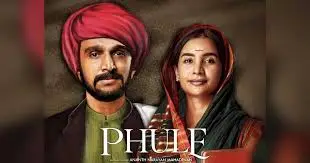Phule movie review: A middling, talky period drama about a remarkable revolutionary couple

A Film with its Heart in the Right Place
Phule attempts to shine a cinematic light on the pioneering efforts of Jyotirao and Savitribai Phule—two of India’s earliest and most impactful social reformers. With a powerful real-life narrative at its core, the film sets out to depict their fight against caste discrimination, their push for universal education, and their undying commitment to uplifting marginalized communities in 19th-century Maharashtra.
But while the intentions are undoubtedly noble, the final product struggles to reach the emotional and narrative heights one might expect from such inspirational material.
A Story of Radical Change
The film begins with the Phules’ early encounters with social injustice. It traces Savitribai’s groundbreaking role as India’s first female teacher and Jyotirao’s resistance against orthodox practices and caste oppression. The story is loaded with impactful moments—establishing the first girls’ school in Pune, being ostracized by society, and standing up for widow remarriage and Dalit rights.
Yet, despite the emotional richness of their lives, the screenplay often feels more like a history lecture than a fully developed cinematic journey. Dialogues lean toward exposition, and several scenes feel static and overly talky—robbing the story of the dynamism it deserves.
Performances That Elevate
Pratik Gandhi delivers a sincere and thoughtful performance as Jyotirao Phule, portraying both the idealism and inner conflicts of a man far ahead of his time. Patralekhaa’s portrayal of Savitribai is equally compelling—grounded, strong-willed, and empathetic. Together, they form a believable and inspiring on-screen couple.
Their chemistry is not overly dramatized, which actually works in favor of authenticity. You get a real sense of partnership—of two revolutionaries walking the same difficult path.
Production & Challenges Behind the Scenes
Originally scheduled for release on Jyotirao Phule’s birth anniversary, the film saw delays due to certification issues and legal hurdles. These included objections to certain depictions and financial disputes related to the film’s production rights. While such controversies are not uncommon in biopics that tackle caste and historical inequity, they do sometimes affect how freely a story can be told.
What Works & What Doesn’t
Strengths:
- A much-needed cinematic homage to two undervalued heroes of Indian history.
- Strong, committed performances from the lead pair.
- Faithfulness to historical facts and milestones.
Weaknesses:
- The storytelling is often dry, with too much dialogue and not enough dramatic tension.
- The pacing can feel sluggish, especially in the second half.
- Lack of cinematic flair to match the depth of the subject matter.
Verdict: Important But Imperfect
Phule deserves credit for bringing attention to two iconic figures who helped shape modern Indian society. It succeeds in highlighting their sacrifices and philosophies, making it a valuable educational piece. However, as a work of cinema, it falls short in emotional engagement and narrative momentum.
Rating: ★★★☆☆ (3 out of 5)
If you’re a history enthusiast or someone curious about India’s social reform movement, Phule is worth a watch. But those looking for a gripping biopic may find it more intellectually stimulating than emotionally satisfying.






